| Listing 1 - 10 of 12 | << page >> |
Sort by
|
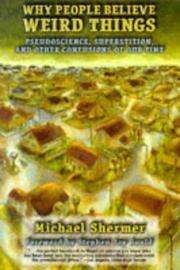
ISBN: 0716733870 Year: 1999 Publisher: New York Freeman
Abstract | Keywords | Export | Availability | Bookmark
 Loading...
Loading...Choose an application
- Reference Manager
- EndNote
- RefWorks (Direct export to RefWorks)
pseudoscience --- superstition --- paranoia --- irrationality
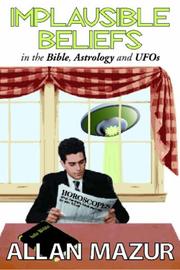
ISBN: 9781412806770 Year: 2008 Publisher: New Brunswick Transaction
Abstract | Keywords | Export | Availability | Bookmark
 Loading...
Loading...Choose an application
- Reference Manager
- EndNote
- RefWorks (Direct export to RefWorks)
Belief and doubt --- Irrationalism (Philosophy) --- Biblia --- Evidences, authority, etc. --- the Bible --- astrology --- UFOs --- beliefs --- irrationality
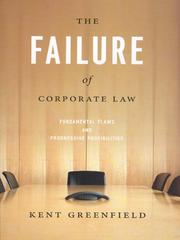
ISBN: 128195697X 9786611956974 0226306984 9780226306988 9781281956972 9780226306933 0226306933 6611956972 Year: 2006 Publisher: Chicago University of Chicago Press
Abstract | Keywords | Export | Availability | Bookmark
 Loading...
Loading...Choose an application
- Reference Manager
- EndNote
- RefWorks (Direct export to RefWorks)
When used in conjunction with corporations, the term "public" is misleading. Anyone can purchase shares of stock, but public corporations themselves are uninhibited by a sense of societal obligation or strict public oversight. In fact, managers of most large firms are prohibited by law from taking into account the interests of the public in decision making, if doing so hurts shareholders. But this has not always been the case, as until the beginning of the twentieth century, public corporations were deemed to have important civic responsibilities. With The Failure of Corporate Law, Kent Greenf
Corporation law --- Corporate governance --- Industrial management --- corporate governance, law, management, industry, corporation, legislation, regulation, government, stock, shareholders, public interest, stakeholders, common good, responsibility, accountability, wealth, economy, business, economics, 9/11, democracy, delaware, fraud, policy, irrationality, judgement, nonfiction, necessity, legal.
Book

ISBN: 8855266934 8855261541 Year: 2022 Publisher: Milano : Ledizioni,
Abstract | Keywords | Export | Availability | Bookmark
 Loading...
Loading...Choose an application
- Reference Manager
- EndNote
- RefWorks (Direct export to RefWorks)
Alla centralità del tema amoroso nella narrativa breve non di rado si connette o si affianca la rappresentazione dell’irrazionalità e della follia, in diversi gradi, forme e manifestazioni: dal tragico al comico, dal drammatico al grottesco, dal serio e grave al parodico e irridente. A tali tematiche, dal Medioevo a Cervantes, e alle loro differenti declinazioni – cui si oppongono specularmente, con maggiore o minore frequenza e intensità, i richiami a principi d’ordine, ragione e misura – sono dedicati i saggi di questo volume, che trae origine dal confronto e dialogo di un gruppo di studiosi di più ambiti disciplinari: Letteratura italiana (Johannes Bartuschat, Anna Maria Cabrini, Sandra Carapezza, Claude Cazalé Bérard, Cristina Zampese); Filologia romanza (Beatrice Barbiellini Amidei, Luca Sacchi); Letteratura spagnola (Antonio Gargano, Maria Rosso); Linguistica italiana (Giuseppe Polimeni).
Language & Linguistics --- le thème de l'amour dans la fiction courte --- irrationalité --- folie --- littérature italienne --- philologie romane --- littérature espagnole --- linguistique italienne --- il tema amoroso nella narrativa breve --- irrazionalità --- follia --- Letteratura italiana --- Filologia romanza --- Letteratura spagnola --- Linguistica italiana --- the love theme in short fiction --- irrationality --- madness --- Italian literature --- Romance philology --- Spanish literature --- Italian linguistics
Book
ISBN: 177112363X 1771123621 9781771123631 9781771123624 Year: 2018 Publisher: Waterloo, Ontario : Wilfrid Laurier University Press,
Abstract | Keywords | Export | Availability | Bookmark
 Loading...
Loading...Choose an application
- Reference Manager
- EndNote
- RefWorks (Direct export to RefWorks)
The year 1930 can be seen as the dawn of a period of darkness, the beginning of a decade that Auden would style "low, dishonest." That year was one of the most reflective moments in modernity. After the optimism of the nineteenth century, the West had stumbled into war in 1914. It managed to survive a conflagration, but it failed in the aftermath to create something valued. In 1930, Europe was questioning itself and its own viability. Where are we heading? a number of public intellectuals asked. Who are we and how do we build moral social and political structures? Can we continue to believe in the insights and healing quality of our culture? Major thinkers-Mann, Woolf, Ortega, Freud, Brecht, Nardal, and Huxley- as well as a number of artists, including Picasso and Magritte, and musicians, such as Weill, sought to grapple with issues that remain central to our lives today: the viability of a secular Europe with Enlightenment values coming to terms with a darker view of human nature mass culture and its dangers; the rise of the politics of irrationality identity and the "other" in Western civilization new ways to represent the postwar world the epistemological dilemma in a world of uncertainty; and the new Fascism-was it a new norm or an aberration? Arthur Haberman sees 1930 as a watershed year in the intellectual life of Europe and with this book, the first to see the contributions of the public intellectuals of 1930 as a single entity, he forces a reconsideration and reinterpretation of the period.
Intellectuals --- History --- Europe --- Intellectual life --- 1930s. --- Aldous Huxley. --- Bertolt Brecht. --- Europe between the wars. --- European public intellectuals. --- Jose Ortega y Gasset. --- Kurt Weill. --- Modernism in art and society. --- Sigmund Freud. --- Thomas Mann. --- Virginia Woolf. --- cultural pessimism. --- irrationality in politics society. --- mass culture. --- the 'Other' in the West.
Book
ISBN: 022602931X 9780226029313 9780226823720 0226823725 9781306192330 1306192331 Year: 2004 Publisher: Paderborn, Germany Chicago, Illinois
Abstract | Keywords | Export | Availability | Bookmark
 Loading...
Loading...Choose an application
- Reference Manager
- EndNote
- RefWorks (Direct export to RefWorks)
One of the most admired artists of the twentieth century, Max Ernst was a proponent of Dada and founder of surrealism, known for his strange, evocative paintings and drawings. In Prehistoric Future, Ralph Ubl approaches Ernst like no one else has, using theories of the unconscious-surrealist automatism, Freudian psychoanalysis, the concept of history as trauma-to examine how Ernst's construction of collage departs from other modern artists. Ubl shows that while Picasso, Braque, and Man Ray used scissors and glue to create collages, Ernst employed techniques he himself had forged-rubbing and scraping to bring images forth onto a sheet of paper or canvas to simulate how a screen image or memory comes into the mind's view. In addition, Ernst scoured the past for obsolete scientific illustrations and odd advertisements to illustrate the rapidity with which time passes and to simulate the apprehension generated when rapid flows of knowledge turn living culture into artifact. Ultimately, Ubl reveals, Ernst was interested in the construction and phenomenology of both collective and individual modern history and memory. Shedding new light on Ernst's working methods and the reasons that his pieces continue to imprint themselves in viewers' memories, Prehistoric Future is an innovative work of critical writing on a key figure of surrealism.
Painting, Modern --- Painting --- History. --- History --- Ernst, Max, --- Ernst, Maximilian, --- Criticism and interpretation. --- Influence. --- Dadaism --- Surrealism --- Superrealism --- Surrealism in art --- Arts, Modern --- Dada --- Tabu-Dadaism --- Dadaism. --- Surrealism. --- Influence (Literary, artistic, etc.). --- Painting, Modern. --- 1900-1999. --- max ernst, painting, painter, art, artist, artwork, history, historical, 20th century, dada, surrealism, unconscious, surrealist automatism, freud, freudian psychoanalysis, trauma, screen image, replication, simulation, scientific illustrations, drawings, frontage, grattage, collages, cultural movement, element of surprise, juxtaposition, avant-garde, nonsense, irrationality, protest.

ISBN: 0226450457 0226450465 9780226450469 9780226217406 022621740X 9780226450452 Year: 1997 Publisher: Chicago [Illinois] London [England]
Abstract | Keywords | Export | Availability | Bookmark
 Loading...
Loading...Choose an application
- Reference Manager
- EndNote
- RefWorks (Direct export to RefWorks)
Leszek Kolakowski delves into some of the most intellectually vigorous questions of our time in this remarkable collection of essays garnished with his characteristic wit. Ten of the essays have never appeared before in English. "Exemplary. . . . It should be celebrated." -Arthur C. Danto, New York Times Book Review "This book . . . express[es] Kolakowski's thought on God, man, reason, history, moral truth and original sin, prompted by observation of the dramatic struggle among Christianity, the Enlightenment and modern totalitarianism. It is a wonderful collection of topics." -Thomas Nagel, Times Literary Supplement "No better antidote to bumper-sticker thinking exists than this collection of 24 'appeals for moderation in consistency,' and never has such an antidote been needed more than it is now." -Joseph Coates, Chicago Tribune "Whether learned or humorous, these essays offer gems in prose of diamond hardness, precision, and brilliance." -Thomas D'Evelyn, The Christian Science Monitor A "Notable Books of the Year 1991" selection, New York Times Book Review-a "Noted with Pleasure" selection, New York Times Book Review-a "Summer Reading 1991" selection, New York Times Book Review-a "Books of the Year" selection, The Times.
Civilization, Modern --- Philosophy, Modern --- Civilization --- Civilisation --- Philosophie --- Philosophy. --- 130.2 "19" --- -Civilization, Modern --- -Philosophy, Modern --- -Modern philosophy --- Modern civilization --- Modernity --- Renaissance --- Barbarism --- Auxiliary sciences of history --- Culture --- World Decade for Cultural Development, 1988-1997 --- Filosofie van de cultuur. Cultuurfilosofie. Cultuursystemen. Kultuurfilosofie--20e eeuw. Periode 1900-1999 --- Philosophy --- History --- -Filosofie van de cultuur. Cultuurfilosofie. Cultuursystemen. Kultuurfilosofie--20e eeuw. Periode 1900-1999 --- 130.2 "19" Filosofie van de cultuur. Cultuurfilosofie. Cultuursystemen. Kultuurfilosofie--20e eeuw. Periode 1900-1999 --- -Modern civilization --- Modern philosophy --- Philosophy and psychology of culture --- Twentieth century --- Philosophy and civilization --- Kolakowski, Leszek --- Civilisation - 20e siècle --- Philosophie - 20e siecle --- Civilisation - Philosophie --- Civilization, Modern - 20th century --- Philosophy, Modern - 20th century --- Civilization - Philosophy --- modernity, intellectuals, barbarians, universalism, kant, exile, sacred, secularism, christianity, faith, revelation, philosophy, nonfiction, fabula mundi, marxism, human rights, revolution, truth, god, divinity, irrationality, politics, ideology, tolerance, democracy, pluralism, utopia, social change, autonomy, culture, national identity.
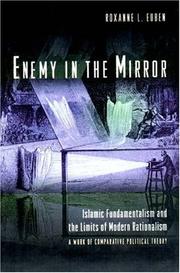
ISBN: 0691058431 069105844X 1282753819 9786612753817 1400823234 140081152X 9781400823239 9780691058443 9780691058436 9781282753815 9781400811526 Year: 2001 Publisher: Princeton Princeton University Press
Abstract | Keywords | Export | Availability | Bookmark
 Loading...
Loading...Choose an application
- Reference Manager
- EndNote
- RefWorks (Direct export to RefWorks)
A firm grasp of Islamic fundamentalism has often eluded Western political observers, many of whom view it in relation to social and economic upheaval or explain it away as an irrational reaction to modernity. Here Roxanne Euben makes new sense of this belief system by revealing it as a critique of and rebuttal to rationalist discourse and post-Enlightenment political theories. Euben draws on political, postmodernist, and critical theory, as well as Middle Eastern studies, Islamic thought, comparative politics, and anthropology, to situate Islamic fundamentalist thought within a transcultural theoretical context. In so doing, she illuminates an unexplored dimension of the Islamist movement and holds a mirror up to anxieties within contemporary Western political thought about the nature and limits of modern rationalism--anxieties common to Christian fundamentalists, postmodernists, conservatives, and communitarians. A comparison between Islamic fundamentalism and various Western critiques of rationalism yields formerly uncharted connections between Western and Islamic political thought, allowing the author to reclaim an understanding of political theory as inherently comparative. Her arguments bear on broad questions about the methods Westerners employ to understand movements and ideas that presuppose nonrational, transcendent truths. Euben finds that first, political theory can play a crucial role in understanding concrete political phenomena often considered beyond its jurisdiction; second, the study of such phenomena tests the scope of Western rationalist categories; and finally, that Western political theory can be enriched by exploring non-Western perspectives on fundamental debates about coexistence.
Islamic fundamentalism --- Rationalism --- Islamic countries --- Politics and government --- Islamic fundamentalism. --- Rationalism. --- #SBIB:031.IO --- #SBIB:321H91 --- #SBIB:316.331H330 --- Knowledge, Theory of --- Religion --- Belief and doubt --- Deism --- Free thought --- Realism --- Fundamentalism, Islamic --- Islamism --- Islam --- Religious fundamentalism --- Niet-specifieke politieke en sociale theorieën vanaf de 19e eeuw: islam, Arabisch nationalisme --- Godsdienst en politiek: algemeen --- -Muslim countries --- Politics and government. --- Islamic countries - Politics and government --- Alterity. --- Ambiguity. --- Anachronism. --- Anathema. --- Anthropomorphism. --- Anti-Oedipus. --- Anti-Western sentiment. --- Anti-imperialism. --- Antinomy. --- Apologetics. --- Assassination. --- Authoritarianism. --- Clash of Civilizations. --- Communitarianism. --- Criticism. --- Critique of ideology. --- Critique. --- Deductive reasoning. --- Deism. --- Demagogue. --- Despotism. --- Dialectical materialism. --- Dichotomy. --- Dictatorship. --- Disadvantage. --- Disenchantment. --- Emotivism. --- End of history. --- Ethnocentrism. --- Excommunication. --- False consciousness. --- False god. --- God. --- Great Satan. --- Hannah Arendt. --- Heresy. --- Heterodoxy. --- Hostility. --- Hypocrisy. --- Ideology. --- Idolatry. --- Impediment (canon law). --- Imperialism. --- Infidel. --- Injunction. --- Inner-worldly asceticism. --- Irrationality. --- Irreligion. --- Islam. --- Islamic extremism. --- Islamism. --- Islamization of knowledge. --- Jamal ad-Din al-Afghani. --- Jihadism. --- Legitimation crisis. --- Manichaeism. --- Materialism. --- Militarism. --- Modernity. --- Nihilism. --- Obscurantism. --- Oppression. --- Orientalism. --- Overreaction. --- Paradox. --- Political Order in Changing Societies. --- Political alienation. --- Political aspects of Islam. --- Political decay. --- Political philosophy. --- Political prisoner. --- Politics. --- Postmodern philosophy. --- Postmodernism. --- Prejudice. --- Protest vote. --- Qutb. --- Radicalism (historical). --- Radicalization. --- Rashid Rida. --- Reactionary. --- Rebuttal. --- Reformism. --- Religion. --- Seditious conspiracy. --- Separate spheres. --- Separation of church and state. --- Sharia. --- Skepticism. --- Social criticism. --- Sovereignty. --- Spiritual crisis. --- Superstition. --- The End of Ideology. --- Truism. --- Vagueness. --- Vulnerability. --- Wahhabism. --- Yellow Peril.
Book
ISBN: 0691603243 1400859387 9781400859382 Year: 2014 Publisher: Princeton Princeton University Press
Abstract | Keywords | Export | Availability | Bookmark
 Loading...
Loading...Choose an application
- Reference Manager
- EndNote
- RefWorks (Direct export to RefWorks)
Michelle Zerba engages current debates about the relationship between literature and theory by analyzing responses of theorists in the Western tradition to tragic conflict. Isolating the centrality of conflict in twentieth-century definitions of tragedy, Professor Zerba discusses the efforts of modern critics to locate in Aristotle's Poetics the origins of this focus on agon. Through a study of ethical and political ideas formative of the Poetics, she demonstrates why Aristotle and his Renaissance and Neoclassical beneficiaries exclude conflict from their accounts of tragedy. The agonistic element, the book argues, first emerges in dramatic criticism in nineteenth-century Romantic theories of the sublime and, more influentially, in Hegel's lectures on drama and history.This turning point in the history of speculation about tragedy is examined with attention to a dynamic between the systematic aims of theory and the subversive conflicts of tragic plays. In readings of various Classical and Renaissance dramatists, Professor Zerba reveals that strife in tragedy undermines expectations of coherence, closure, and moral stability, on which theory bases its principles of dramatic order. From Aristotle to Hegel, the philosophical interest in securing these principles determines attitudes toward conflict.Originally published in 1988.The Princeton Legacy Library uses the latest print-on-demand technology to again make available previously out-of-print books from the distinguished backlist of Princeton University Press. These editions preserve the original texts of these important books while presenting them in durable paperback and hardcover editions. The goal of the Princeton Legacy Library is to vastly increase access to the rich scholarly heritage found in the thousands of books published by Princeton University Press since its founding in 1905.
Conflict (Psychology) in literature. --- Tragedy. --- Drama --- Aristotle. --- Aeschylus. --- Aesthetic Theory. --- Anguish. --- Antinomy. --- Antithesis. --- Appeal to emotion. --- Ars Poetica (Horace). --- Averroes. --- Bussy D'Ambois. --- Catharsis. --- Characters of Shakespear's Plays. --- Classical unities. --- Classicism. --- Closed circle. --- Coluccio Salutati. --- Consciousness. --- Contemptus mundi. --- Critical theory. --- Criticism. --- Critique. --- Decorum. --- Deontological ethics. --- Dialectic. --- Disputation. --- Dissoi logoi. --- Divine law. --- Dramatic theory. --- Ethical dilemma. --- Euripides. --- Existentialism. --- Externality. --- Francis Fergusson. --- Good and evil. --- Greek tragedy. --- Hamartia. --- Hannah Arendt. --- Hedonism. --- Hegelianism. --- Hubris. --- Intentionality. --- Irony. --- Irrational Man. --- Irrationality. --- Jacques Derrida. --- Jean Hyppolite. --- Karl Jaspers. --- King Lear. --- Literary criticism. --- Literary theory. --- Lodovico Castelvetro. --- Mental space. --- Mimesis. --- Moral absolutism. --- Moral realism. --- Morality. --- Myth. --- New Thought. --- Nicomachean Ethics. --- On Truth. --- Pathos. --- Philosopher. --- Philosophy. --- Pity. --- Platitude. --- Plautus. --- Poetics (Aristotle). --- Poetry. --- Polonius. --- Pre-Socratic philosophy. --- Prohairesis. --- Quintilian. --- Rationality. --- Renaissance tragedy. --- Republic (Plato). --- Revenge tragedy. --- Rhetoric. --- Romanticism. --- Satire. --- Scholasticism. --- Shakespearean tragedy. --- Sophocles. --- Stephen Greenblatt. --- Suffering. --- Superiority (short story). --- Søren Kierkegaard. --- Teleology. --- The Birth of Tragedy. --- The Marriage of Heaven and Hell. --- The Philosopher. --- Theodicy. --- Theory. --- Thomas Kyd. --- Thought. --- Tragic hero. --- Verisimilitude. --- W. D. Ross. --- William Prynne. --- William Shakespeare.
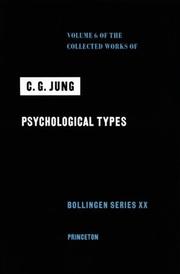
ISBN: 0691097704 9780691097701 140085086X 0691018138 1306408113 Year: 1974 Publisher: Princeton (N.J.): Princeton university press,
Abstract | Keywords | Export | Availability | Bookmark
 Loading...
Loading...Choose an application
- Reference Manager
- EndNote
- RefWorks (Direct export to RefWorks)
One of the most important of Jung's longer works, and probably the most famous of his books, Psychological Types appeared in German in 1921 after a "fallow period" of eight years during which Jung had published little. He called it "the fruit of nearly twenty years' work in the domain of practical psychology," and in his autobiography he wrote: "This work sprang originally from my need to define the ways in which my outlook differed from Freud's and Adler's. In attempting to answer this question, I came across the problem of types; for it is one's psychological type which from the outset determines and limits a person's judgment. My book, therefore, was an effort to deal with the relationship of the individual to the world, to people and things. It discussed the various aspects of consciousness, the various attitudes the conscious mind might take toward the world, and thus constitutes a psychology of consciousness regarded from what might be called a clinical angle." In expounding his system of personality types Jung relied not so much on formal case data as on the countless impressions and experiences derived from the treatment of nervous illnesses, from intercourse with people of all social levels, "friend and foe alike," and from an analysis of his own psychological nature. The book is rich in material drawn from literature, aesthetics, religion, and philosophy. The extended chapters that give general descriptions of the types and definitions of Jung's principal psychological concepts are key documents in analytical psychology.
Personality --- Typology (Psychology) --- Personality. --- Mental types --- Psychological types --- Type (Psychology) --- Types, Mental --- Types, Psychological --- Characters and characteristics --- Psychology --- Temperament --- Personal identity --- Personality psychology --- Personality theory --- Personality traits --- Personology --- Traits, Personality --- Individuality --- Persons --- Self --- Abstraction. --- Academic psychologist. --- Aestheticism. --- Affect (psychology). --- Allegory of the Cave. --- Analogy. --- Analytical psychology. --- Antithesis. --- Arthur Schopenhauer. --- Carl Jung. --- Causality. --- Celtic mythology. --- Certainty. --- Cognition. --- Concept. --- Conscience. --- Consciousness. --- Critical psychology. --- Criticism. --- Delusion. --- Determination. --- Disposition. --- Dissociation (psychology). --- Doctrine. --- Dynamism (metaphysics). --- Empathy. --- Existence. --- Explanation. --- Externalization. --- Extraversion and introversion. --- Fanaticism. --- Feeling. --- Good and evil. --- Hatred. --- Idealism. --- Imagination. --- Individual psychology. --- Individual. --- Individualism. --- Inference. --- Inferiority complex. --- Intellect. --- Intellectualism. --- Introjection. --- Irrationality. --- Lecture. --- Libido. --- Materialism. --- Mental disorder. --- Morality. --- Multitude. --- Nature. --- Neurosis. --- Nominalism. --- Objectivity (philosophy). --- Observation. --- Overreaction. --- Paragraph. --- Parapsychology. --- Participation mystique. --- Perception. --- Personal equation. --- Phenomenon. --- Philosopher. --- Philosophy. --- Physiognomy. --- Potentiality and actuality. --- Prejudice. --- Principle. --- Protestantism. --- Psyche (psychology). --- Psychiatrist. --- Psychic. --- Psychoanalysis. --- Psychological Types. --- Psychologist. --- Psychology of the Unconscious. --- Psychology. --- Psychotherapy. --- Rationality. --- Reality. --- Reason. --- Religion. --- Requirement. --- Result. --- Rosicrucianism. --- Self-criticism. --- Sense. --- Spirituality. --- Stupidity. --- Suggestion. --- Symbols of Transformation. --- Symptom. --- Temperament. --- The Philosopher. --- Theory. --- Thought. --- Transference. --- Unconsciousness. --- Writing.
| Listing 1 - 10 of 12 | << page >> |
Sort by
|

 Search
Search Feedback
Feedback About UniCat
About UniCat  Help
Help News
News